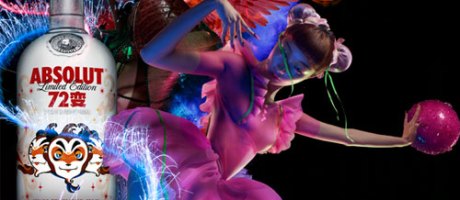 Swedish Vodka brand Absolut has this month produced 350,000 limited edition bottles solely for the Chinese market. The limited edition range is branded as Absolut 72变. The Chinese character ‘ 变‘ is written in pinyin as ‘Biàn’, which translates in English to mean ‘Transformations’ or ‘Changes’.
Swedish Vodka brand Absolut has this month produced 350,000 limited edition bottles solely for the Chinese market. The limited edition range is branded as Absolut 72变. The Chinese character ‘ 变‘ is written in pinyin as ‘Biàn’, which translates in English to mean ‘Transformations’ or ‘Changes’.
Why ‘72 Transformations’?
The name is a reference to the Chinese novel Journey to West, further details about the famous book can be found in one my previous posts here. Absolut has dedicated the designs / title of it’s range around arguably the most famous character in the novel – Sun Wukong (孫悟空) – aka The Monkey King.
The print ads
Before I get on to explaining the significance of The Monkey King, we will get onto looking at the bottle designs and their advertisements (below). Absolut wanted to ensure that the bottles had a true feel of China and innovation, so they hired two local Chinese creatives — the artist Gāo Yǔ (高瑀) and photographer Chén Màn (陈曼). Gāo designed the bottles and Chén created the associated photography. The results of their collaboration are stunning:
Who is Sun Wukong?
He is the first character that readers come across in the novel Journey to the West . He was born out of a mystical stone which gave him immense powers including super speed and incredible strength.

Yet his greatest power came in his ability to perform 72 transformations. He could change himself into everyday objects as well as people themselves.
For many years he was happy ruling the monkeys who lived on his home mountain. However, Sun quickly realised that despite all his powers he was still only mortal so he went up to Heaven to seek immortality — but was refused. So he started a war with the gods and caused havoc in the heavenly kingdom.
It was only when Buddha stepped in that the Monkey King was impeded. Buddha imprisoned him under a mountain. 500 years later a monk was sent to travel from China to India to collect the holy Buddhist scriptutres, he took Monkey out of Buddha’s imprisonment and made him his disciple and the tales they have travelling together form the basis of Journey to the West.
Why do so many brands utilise Sun Wukong?
Sun Wukong has become much more than just a character in a book. He is a hero to many Chinese citizens, and he is embedded deep into Chinese culture of past and present. Chairman Máo Zédōng (毛泽东) referred to the Monkey when he promised to bring China out of poverty. There is a even Chinese festival to celebrate him.
If you’re a film-fanatic, a character resembling the hero also appeared the 2008 film ‘The Forbidden Kingdom‘ starring Jet Li and Jackie Chan.
For those of you in the UK, you may remember the Monkey as part of the BBC‘s Beijing 2008 Olympics coverage:
Sun Wukong is a national symbol of Chinese people and their values, which is why so many western and domestic brands utilise him as a tool to communicate messages to the country’s consumers.






